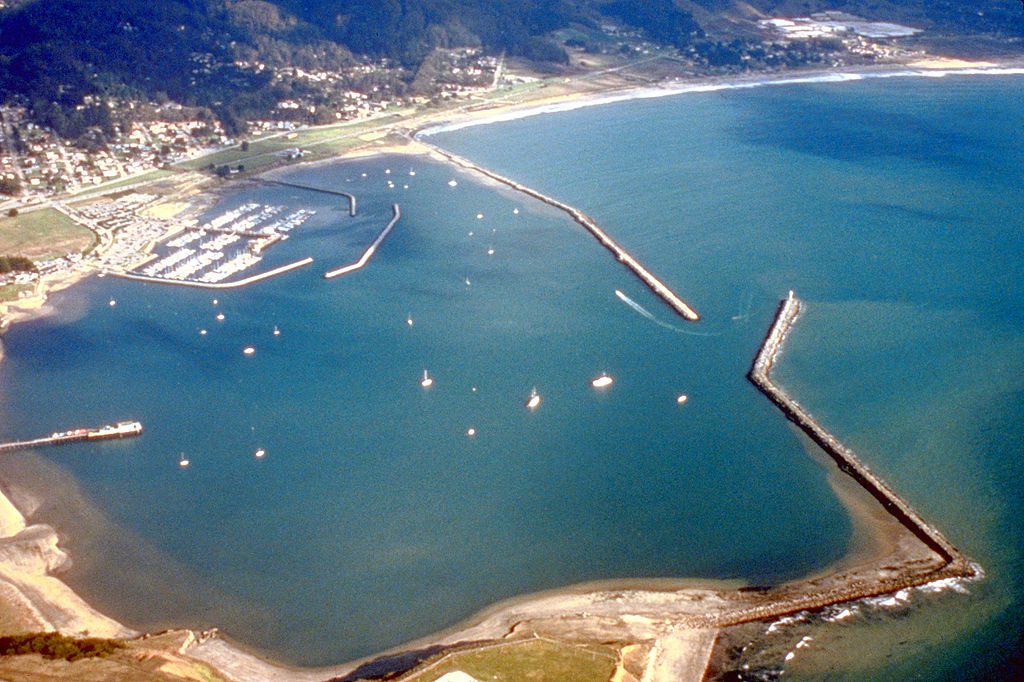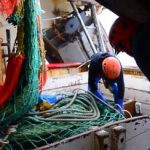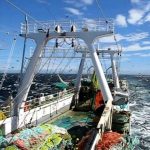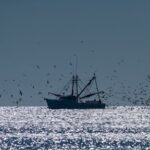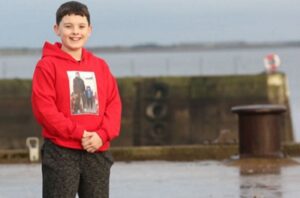Monthly Archives: January 2016
Tri Marine International not surprised by US withdrawal from Tuna Treaty
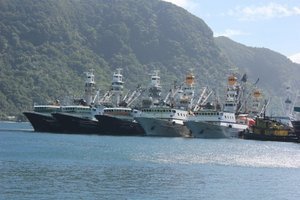 Tri Marine International is not surprised by the US Government’s announcement its withdrawing from the South Pacific Tuna Treaty. In a statement issued this afternoon the owners of local cannery Samoa Tuna Processors say it remains focused on ensuring the long term stability of its operations in American Samoa. The cannery said the current Treaty is tied to a reality that no longer exists and needs to be rebuilt from the ground up to meet the needs of both the Pacific Island Parties and the U.S. boat owners as Asian interests continue to expand their reach into the region. Read the article here 15:00
Tri Marine International is not surprised by the US Government’s announcement its withdrawing from the South Pacific Tuna Treaty. In a statement issued this afternoon the owners of local cannery Samoa Tuna Processors say it remains focused on ensuring the long term stability of its operations in American Samoa. The cannery said the current Treaty is tied to a reality that no longer exists and needs to be rebuilt from the ground up to meet the needs of both the Pacific Island Parties and the U.S. boat owners as Asian interests continue to expand their reach into the region. Read the article here 15:00
Nova Scotia to Cooke Aquaculture: Pay up on $18m loan
 The provincial government is calling in Cooke Aquaculture’s $18-million loan. The money comes from a major loan announced by the former NDP government in 2012. The government was to make up to $25 million available for the company, $9 million of it forgivable, if Cooke could expand a feed mill in Truro, build a salmon hatchery in Digby County and a processing plant in Shelburne, and create up to 400 jobs across the province. “We fully expect Cooke Aquaculture to live up to their component of that agreement,”,,, Read the article here 10:37
The provincial government is calling in Cooke Aquaculture’s $18-million loan. The money comes from a major loan announced by the former NDP government in 2012. The government was to make up to $25 million available for the company, $9 million of it forgivable, if Cooke could expand a feed mill in Truro, build a salmon hatchery in Digby County and a processing plant in Shelburne, and create up to 400 jobs across the province. “We fully expect Cooke Aquaculture to live up to their component of that agreement,”,,, Read the article here 10:37
North Carolina Fishermen meet to determine disbursement procedures
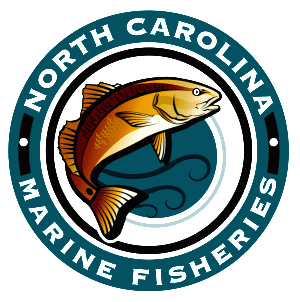 Work will begin today to establish procedures for authorizing the disbursement of money collected through a new state fund created to meet requirements for the protection of sea turtles while also supporting projects that enhance the state’s commercial fishing industry. The funding committee of the North Carolina Commercial Fishing Resource Fund and a corresponding committee of the North Carolina Marine Fisheries Commission will hold their first meeting today at 2 p.m. at the division headquarters, 3441 Arendell St. in Morehead City. of the North Carolina Fisheries Association said the meeting will be organizational as work begins to establish a Memorandum of Understanding. Read the article here 10:03
Work will begin today to establish procedures for authorizing the disbursement of money collected through a new state fund created to meet requirements for the protection of sea turtles while also supporting projects that enhance the state’s commercial fishing industry. The funding committee of the North Carolina Commercial Fishing Resource Fund and a corresponding committee of the North Carolina Marine Fisheries Commission will hold their first meeting today at 2 p.m. at the division headquarters, 3441 Arendell St. in Morehead City. of the North Carolina Fisheries Association said the meeting will be organizational as work begins to establish a Memorandum of Understanding. Read the article here 10:03
Cod was key to our survival – Earl Snelgrove, St. John’s
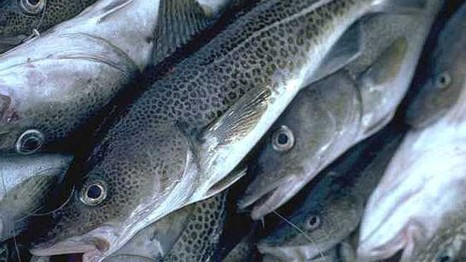 I was born in the small fishing community of Grates Cove, Trinity Bay near Baccalieu Island in the later part of the 1920s and used to go fishing with my father and some of my brothers. My father had three cod traps which he inherited from my grandfather. We set those traps by the shoreline not more than 20 fathoms (about 120 feet) off from the shore. About the time the caplin came to the beaches from the Grand Banks for spawning, anytime from mid-June or early July, we would set our traps, and the cod chasing the caplin would be led into the traps by means of a leader. Read the rest here 09:35
I was born in the small fishing community of Grates Cove, Trinity Bay near Baccalieu Island in the later part of the 1920s and used to go fishing with my father and some of my brothers. My father had three cod traps which he inherited from my grandfather. We set those traps by the shoreline not more than 20 fathoms (about 120 feet) off from the shore. About the time the caplin came to the beaches from the Grand Banks for spawning, anytime from mid-June or early July, we would set our traps, and the cod chasing the caplin would be led into the traps by means of a leader. Read the rest here 09:35
Family of Coos Bay fisherman: ‘He was a remarkable man’
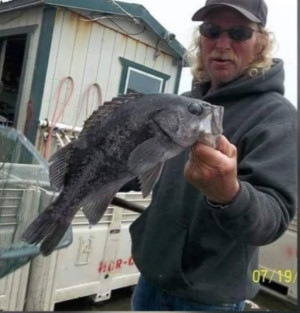 The US Coast Guard has suspended their search for two fishermen presumed lost at sea, after their boat struck a jetty and capsized near Coos Bay. Family has identified a third crew member as Blaine Steinmetz. They tell FOX 12 his body was found hours after the wreckage. Blaine Steinmetz knew the risks of being out on the open seas, but did it anyway because he loved it, according to his stepdaughter Amy Sad. And she loved that about him. Read the article here 08:35
The US Coast Guard has suspended their search for two fishermen presumed lost at sea, after their boat struck a jetty and capsized near Coos Bay. Family has identified a third crew member as Blaine Steinmetz. They tell FOX 12 his body was found hours after the wreckage. Blaine Steinmetz knew the risks of being out on the open seas, but did it anyway because he loved it, according to his stepdaughter Amy Sad. And she loved that about him. Read the article here 08:35
Fishermen in court to protest at-sea monitoring cost shift
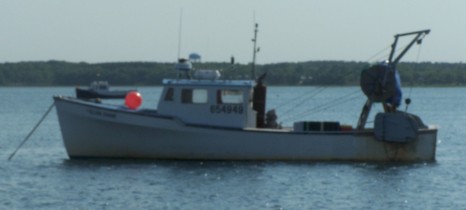 A group of East Coast fishermen who are challenging the federal government about the cost of at-sea monitoring is due for a hearing in court. New England fishermen will have to start paying the cost of at-sea monitors soon under new rules. Fishermen challenging the rules are due in U.S. District Court in Concord on Thursday for a hearing on their motion for an injunction. At-sea monitors collect data to help determine future fishing quotas. The monitors can cost about $800 per trip. A group of fishermen contends that the cost shift is illegal. One of the fishermen involved in the lawsuit is Hampton, New Hampshire-based David Goethel. He says many fishermen won’t be able to afford the added cost. Link 07:59
A group of East Coast fishermen who are challenging the federal government about the cost of at-sea monitoring is due for a hearing in court. New England fishermen will have to start paying the cost of at-sea monitors soon under new rules. Fishermen challenging the rules are due in U.S. District Court in Concord on Thursday for a hearing on their motion for an injunction. At-sea monitors collect data to help determine future fishing quotas. The monitors can cost about $800 per trip. A group of fishermen contends that the cost shift is illegal. One of the fishermen involved in the lawsuit is Hampton, New Hampshire-based David Goethel. He says many fishermen won’t be able to afford the added cost. Link 07:59
Oregon – Crabs safe after toxin scare; prices fall
 A toxic algae bloom that shut down the West Coast’s entire shellfish industry may actually be good news for crab lovers, according to some crabbers. The price for crabs has plummeted because people are hesitant to buy them after the highly publicized toxin scare, reported The Oregonian. But the creatures are safe to eat. “The consumer is going to get a far superior product,” said John Corbin, head of the Oregon Dungeness Crab Commission. “They’re going to get a great, stuffed-full crab right now.” Read the article here 18:44
A toxic algae bloom that shut down the West Coast’s entire shellfish industry may actually be good news for crab lovers, according to some crabbers. The price for crabs has plummeted because people are hesitant to buy them after the highly publicized toxin scare, reported The Oregonian. But the creatures are safe to eat. “The consumer is going to get a far superior product,” said John Corbin, head of the Oregon Dungeness Crab Commission. “They’re going to get a great, stuffed-full crab right now.” Read the article here 18:44
Drunken Fish? Lost at Sea? Rising carbon dioxide emissions pose ‘intoxication’ threat to world’s ocean fish
 Researchers have found that carbon dioxide concentrations in seawater could reach levels high enough to make fish ‘intoxicated’ and disoriented many decades earlier than previously thought, with serious implications for the world’s fisheries. “Our results were staggering and have massive implications for global fisheries and marine ecosystems across the planet,” says lead author, Dr Ben McNeil, of the UNSW Climate Change Research Centre. “High concentrations of cause fish to become intoxicated — a phenomenon known as hypercapnia. Essentially, the fish become lost at sea. Read the article here 16:27
Researchers have found that carbon dioxide concentrations in seawater could reach levels high enough to make fish ‘intoxicated’ and disoriented many decades earlier than previously thought, with serious implications for the world’s fisheries. “Our results were staggering and have massive implications for global fisheries and marine ecosystems across the planet,” says lead author, Dr Ben McNeil, of the UNSW Climate Change Research Centre. “High concentrations of cause fish to become intoxicated — a phenomenon known as hypercapnia. Essentially, the fish become lost at sea. Read the article here 16:27
Nova Scotians eager to crack lobster caper
 Small fishing villages along Nova Scotia’s southern shore are buzzing over a whodunit involving 48 crates of pricey, premium-grade lobster that were hauled out of an ocean-based pen in a brazen night-time heist. Theories are swirling among fishermen and residents around Cape Sable Island about how someone made off with dozens of heavy plastic crates that were packed with high-grade lobsters valued at up to $31,000.“Everybody’s talking about it,” said RCMP Cpl. Mike O’Callaghan, who has been investigating the unusual caper since the company holding the crustaceans noticed they were gone last week. Read the article here 15:04
Small fishing villages along Nova Scotia’s southern shore are buzzing over a whodunit involving 48 crates of pricey, premium-grade lobster that were hauled out of an ocean-based pen in a brazen night-time heist. Theories are swirling among fishermen and residents around Cape Sable Island about how someone made off with dozens of heavy plastic crates that were packed with high-grade lobsters valued at up to $31,000.“Everybody’s talking about it,” said RCMP Cpl. Mike O’Callaghan, who has been investigating the unusual caper since the company holding the crustaceans noticed they were gone last week. Read the article here 15:04
Athearn Marine Agency Boat of the Week: 55′ RI Marine Lobster – Big Price Reduction!
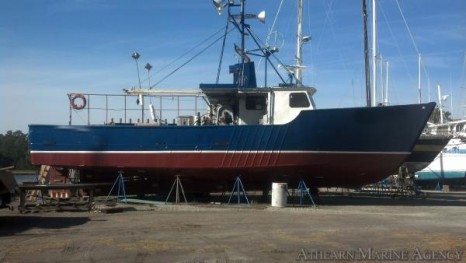 Specifications, information and 25 photo’s click here To see all the boats in this series, Click here 12:41
Specifications, information and 25 photo’s click here To see all the boats in this series, Click here 12:41
North Carolina Fisheries Association Weekly Update for January 18, 2016
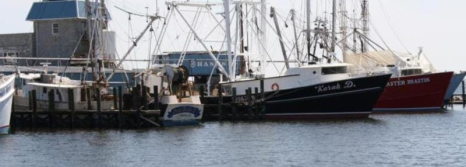 Click here to read the Weekly Update, to read all the updates, Click here 12:22
Click here to read the Weekly Update, to read all the updates, Click here 12:22
Mississippi Sound – Day two of oyster relay moves more smoothly
Tuesday marks day two of the oyster relay program organized by the Mississippi Department of Marine Resources. Oyster fishermen are being paid to relocate thousands of oysters away from the harmful impact of freshwater intrusion caused by the opening of the Bonnet Carre Spillway. Near the mouth of Biloxi Back Bay, heavy equipment and high pressure water hoses helped offload a barge full of oysters onto an existing reef Tuesday morning. They are among the oysters relayed from the eastern portion of the Mississippi Sound. Read the article here 11:01
White House, Greens target Atlantic fishing grounds
 Fishermen and seafood-dependent communities in New England are battening down the hatches, fearing that an Obama administration move to create a giant Atlantic Marine Monument will spell the end to their way of life. Led by Earthjustice, the Conservation Law Center, Natural Resources Defense Council, National Geographic Society, and the Pew Charitable Trust, environmentalists are urging the White House to use the 1906 Antiquities Act to designate a 6,000-square-mile area in the and off the coast of Massachusetts as a National Monument. Read the rest here 09:25
Fishermen and seafood-dependent communities in New England are battening down the hatches, fearing that an Obama administration move to create a giant Atlantic Marine Monument will spell the end to their way of life. Led by Earthjustice, the Conservation Law Center, Natural Resources Defense Council, National Geographic Society, and the Pew Charitable Trust, environmentalists are urging the White House to use the 1906 Antiquities Act to designate a 6,000-square-mile area in the and off the coast of Massachusetts as a National Monument. Read the rest here 09:25
A sign from the sea – Big Pine Key trap washes ashore in Ireland
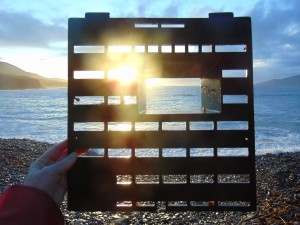 Rosemary Hill never knows what the sea will bring to her that day. She has a passion for beachcombing on the sandy strands next to her hometown of Waterville, a small fishing village in County Kerry, Ireland. In recent weeks, among other things, she’s found a multitude of tropical sea beans, a half-destroyed Christmas decoration and Hewlett-Packard printer ink cartridges. On Jan. 8, she discovered something intriguing: the top of a stone crab trap. “We don’t have these in Ireland,” she thought. And when she looked closely, she saw a name scratched into the surface: “J. Gates, Big Pine Key.” photo; Rosemary Hill, “Beachcombing in Kerry,”link Read the article here 08:29
Rosemary Hill never knows what the sea will bring to her that day. She has a passion for beachcombing on the sandy strands next to her hometown of Waterville, a small fishing village in County Kerry, Ireland. In recent weeks, among other things, she’s found a multitude of tropical sea beans, a half-destroyed Christmas decoration and Hewlett-Packard printer ink cartridges. On Jan. 8, she discovered something intriguing: the top of a stone crab trap. “We don’t have these in Ireland,” she thought. And when she looked closely, she saw a name scratched into the surface: “J. Gates, Big Pine Key.” photo; Rosemary Hill, “Beachcombing in Kerry,”link Read the article here 08:29
3 fishermen missing after vessel capsized near Coos Bay, Ore.
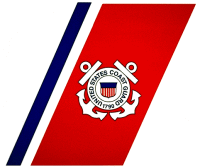 The Coast Guard is searching for 3 fisherman who went missing Tuesday night after their boat capsized more than a mile off the entrance to Coos Bay. Four fisherman were aboard a 40-foot crabbing vessel when it had a “mishap” off the North Jetty in Coos Bay. The boat made it to shore, but only one of the fisherman was on board. A Good Samaritan picked him up and dropped him off at Air Station North Bend. His condition is currently unknown. Read the post here, more info to follow. 07:45
The Coast Guard is searching for 3 fisherman who went missing Tuesday night after their boat capsized more than a mile off the entrance to Coos Bay. Four fisherman were aboard a 40-foot crabbing vessel when it had a “mishap” off the North Jetty in Coos Bay. The boat made it to shore, but only one of the fisherman was on board. A Good Samaritan picked him up and dropped him off at Air Station North Bend. His condition is currently unknown. Read the post here, more info to follow. 07:45
AK plans to cut salmon bycatch in Bering Sea pollock fishery; Comments wanted
 Federal fish managers are proposing changes to the Bering Sea pollock fishery to better reduce bycatch of Chinook and chum salmon, and they want input from the public. The fishery now has separate programs to account for takes of the two salmon species – for Chinook, incentives are provided to each vessel to avoid bycatch at all times. For chum salmon, Intercooperative agreements help the fleets avoid areas of high bycatch. The North Pacific Council wants to integrate the two programs. Read the post here 19:22
Federal fish managers are proposing changes to the Bering Sea pollock fishery to better reduce bycatch of Chinook and chum salmon, and they want input from the public. The fishery now has separate programs to account for takes of the two salmon species – for Chinook, incentives are provided to each vessel to avoid bycatch at all times. For chum salmon, Intercooperative agreements help the fleets avoid areas of high bycatch. The North Pacific Council wants to integrate the two programs. Read the post here 19:22
NE Fishery Management Council SSC Meeting, Boston Jan. 20, 2016 SSC – Listen by webinar
 The public is invited to listen in to the January 20, 2016 Scientific and Statistical Committee Meeting (SSC). It is scheduled to begin at 9:00 a.m. at the Hilton Garden Inn Boston Logan Airport, 100 Boardman Street. : Use this link Hilton Garden Inn for further information about the venue. Click here for Webinar Registration Notice, and Agenda here 16:37
The public is invited to listen in to the January 20, 2016 Scientific and Statistical Committee Meeting (SSC). It is scheduled to begin at 9:00 a.m. at the Hilton Garden Inn Boston Logan Airport, 100 Boardman Street. : Use this link Hilton Garden Inn for further information about the venue. Click here for Webinar Registration Notice, and Agenda here 16:37
North Carolina Fisheries Association – SPECIAL UPDATE!!!
 SPECIAL UPDATE!!! Attached above is a pdf flyer for several meetings this coming Monday, January 25th, all to be held at the Riverfront Convention Center in New Bern. Please print out the flyer and post it on your bulletin board if you have one, or distribute to encourage fishermen to attend the Annual Meeting! 10:00 – 2:00 Bycatch Reduction Workshop 2:00 – 3:00 Southern Shrimp Alliance Survey 3:00 – ? NCFA’s Annual Meeting. Attendance at NCFA’s Annual Meeting is very important as critical issues will be discussed, including southern flounder and the election of the Board of Directors will be held. If you cannot attend, please send a proxy to [email protected] or call (252) 633-6232 ext 102.
SPECIAL UPDATE!!! Attached above is a pdf flyer for several meetings this coming Monday, January 25th, all to be held at the Riverfront Convention Center in New Bern. Please print out the flyer and post it on your bulletin board if you have one, or distribute to encourage fishermen to attend the Annual Meeting! 10:00 – 2:00 Bycatch Reduction Workshop 2:00 – 3:00 Southern Shrimp Alliance Survey 3:00 – ? NCFA’s Annual Meeting. Attendance at NCFA’s Annual Meeting is very important as critical issues will be discussed, including southern flounder and the election of the Board of Directors will be held. If you cannot attend, please send a proxy to [email protected] or call (252) 633-6232 ext 102.Ocean fish catches 50% higher than reported, study suggests
 Humans are scooping millions of tonnes more fish out of the oceans than official statistics show — about 50 per cent more, estimates a new Canadian study that sheds some light on the extent of the problem and on who’s catching all those extra fish. Statistics compiled by the Food and Agriculture Organization of the United Nations (FAO) and cited by the study show that global marine catches between 1950 and 2010 peaked in 1996 at 86 million tonnes before declining by around 0.38 million tonnes per year. But by scouring out and including around the world, the new study by Daniel Pauly and Dirk Zeller at the University of British Columbia and their 400 global collaborators,,, Read the article here 15:30
Humans are scooping millions of tonnes more fish out of the oceans than official statistics show — about 50 per cent more, estimates a new Canadian study that sheds some light on the extent of the problem and on who’s catching all those extra fish. Statistics compiled by the Food and Agriculture Organization of the United Nations (FAO) and cited by the study show that global marine catches between 1950 and 2010 peaked in 1996 at 86 million tonnes before declining by around 0.38 million tonnes per year. But by scouring out and including around the world, the new study by Daniel Pauly and Dirk Zeller at the University of British Columbia and their 400 global collaborators,,, Read the article here 15:30
Study: Narragansett Bay temps reached record highs, lows last year
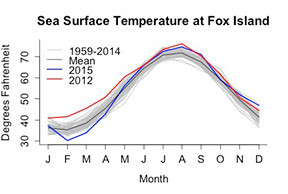 An oceanographer at the University of Rhode Island’s Graduate School of Oceanography said temperatures in Narragansett Bay hit record highs and lows in 2015. Jeremy Collie said the temperatures represent the “most extreme” fluctuations observed since the school started surveying the waters 56 years ago. The findings came from GSO’s Narragansett Bay Fish Trawl, which is done to sample fish every week in the bay and track seasonal or annual changes of marine life. Water temperature also is recorded weekly at the same site off Wickford Village in North Kingstown. Collie has managed the trawl since 1998. Read the article here 12:25
An oceanographer at the University of Rhode Island’s Graduate School of Oceanography said temperatures in Narragansett Bay hit record highs and lows in 2015. Jeremy Collie said the temperatures represent the “most extreme” fluctuations observed since the school started surveying the waters 56 years ago. The findings came from GSO’s Narragansett Bay Fish Trawl, which is done to sample fish every week in the bay and track seasonal or annual changes of marine life. Water temperature also is recorded weekly at the same site off Wickford Village in North Kingstown. Collie has managed the trawl since 1998. Read the article here 12:25
US announces withdrawal from crucial fisheries treaty with Pacific nations
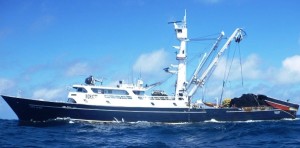 The United States has given Pacific Island nations notice that it plans to withdraw from the South Pacific Tuna Treaty, one of its most important aid, trade and geopolitical arrangements with the region. The 27-year-old treaty is set to expire 12 months from the date of the withdrawal notice. The announcement came after Washington agreed to pay $128 million ($US89m) for its 2016 fishing days, but within months reneged on the deal saying its fleet could not afford to pay. The US action risks its boats being shut out of hundreds of thousands of square kilometres of ocean as other global fishing powers, including China, gain more access. Read the article here 11:18
The United States has given Pacific Island nations notice that it plans to withdraw from the South Pacific Tuna Treaty, one of its most important aid, trade and geopolitical arrangements with the region. The 27-year-old treaty is set to expire 12 months from the date of the withdrawal notice. The announcement came after Washington agreed to pay $128 million ($US89m) for its 2016 fishing days, but within months reneged on the deal saying its fleet could not afford to pay. The US action risks its boats being shut out of hundreds of thousands of square kilometres of ocean as other global fishing powers, including China, gain more access. Read the article here 11:18
UCSC professor explains toxin’s effect on crab
 UC Santa Cruz Professor of Ocean Science Raphael Kudela explained how this unusual phenomenon occurred and what we can expect next year as part of the university’s Science Sunday lecture series. “The duration of the 2015 bloom and the intensity of the toxicity were unprecedented, and that led to record levels of the toxin in species such as anchovies, razor clams, and crabs,” Kudela said. “We also saw the toxin in organisms and parts of organisms where we thought it was not supposed to be, like the filets of fish.” Read the article here 10:25
UC Santa Cruz Professor of Ocean Science Raphael Kudela explained how this unusual phenomenon occurred and what we can expect next year as part of the university’s Science Sunday lecture series. “The duration of the 2015 bloom and the intensity of the toxicity were unprecedented, and that led to record levels of the toxin in species such as anchovies, razor clams, and crabs,” Kudela said. “We also saw the toxin in organisms and parts of organisms where we thought it was not supposed to be, like the filets of fish.” Read the article here 10:25
The quest to save South Mississippi’s oysters – Fishermen begin oyster relay under DMR program
 The quest to save South Mississippi’s oysters continued Monday. Coast fishermen were out on the Mississippi Sound all morning working to relocate oysters. The fishermen were working with the Department of Marine Resources to not only save the oyster crop, but to also save their livelihood. For the first time in months, the was alive with activity as fishermen readied their boats for a day’s work. Over the past five years, many of these fishermen have had a very limited amount of time on the water, if any. “Everybody’s excited to do it,” said fisherman Shelby Cooper. Read the article here 10:12
The quest to save South Mississippi’s oysters continued Monday. Coast fishermen were out on the Mississippi Sound all morning working to relocate oysters. The fishermen were working with the Department of Marine Resources to not only save the oyster crop, but to also save their livelihood. For the first time in months, the was alive with activity as fishermen readied their boats for a day’s work. Over the past five years, many of these fishermen have had a very limited amount of time on the water, if any. “Everybody’s excited to do it,” said fisherman Shelby Cooper. Read the article here 10:12
Anna Maria crabber vs. shark fisher debate begins
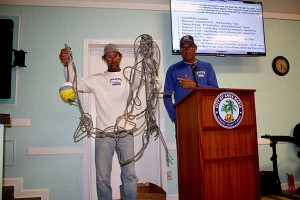 It was a standing-room only meeting, as attendees filled the seats inside the chambers and filled the hallway. Anthony Manali, a stone crabber and owner of Captain Anthony’s Stone Crab Store, was the first to speak. “I don’t care if you shark fish,” Manali said. “You can shark fish all you want. But that inside line on the beach has historically been where we make most of our income at the beginning of the stone crab season. It’s very important for us to be there.” Manali had brought the stone crab issue to the commission in December, saying late-night shark fishers were destroying many of his stone crab traps. Manali valued his loss — traps and potential catch over several years — at $40,000. Read the article here 08:53:
It was a standing-room only meeting, as attendees filled the seats inside the chambers and filled the hallway. Anthony Manali, a stone crabber and owner of Captain Anthony’s Stone Crab Store, was the first to speak. “I don’t care if you shark fish,” Manali said. “You can shark fish all you want. But that inside line on the beach has historically been where we make most of our income at the beginning of the stone crab season. It’s very important for us to be there.” Manali had brought the stone crab issue to the commission in December, saying late-night shark fishers were destroying many of his stone crab traps. Manali valued his loss — traps and potential catch over several years — at $40,000. Read the article here 08:53:
Sneads Ferry Fishermen voice their concerns about portion of New River proposed to close
 Camp Lejeune officials proposed shutting down a portion of the New River which could cost fishermen thousands of dollars. Many of the fishermen in Onslow County are concerned about an eight and a half mile portion of the New River that could be shut down in the coming months. One fisherman 9 On Your Side spoke with says the reason this is all coming into play is because Camp Lejeune officials say old bombs scattered across the river bottom could still be active. Video, Read the article here 08:16
Camp Lejeune officials proposed shutting down a portion of the New River which could cost fishermen thousands of dollars. Many of the fishermen in Onslow County are concerned about an eight and a half mile portion of the New River that could be shut down in the coming months. One fisherman 9 On Your Side spoke with says the reason this is all coming into play is because Camp Lejeune officials say old bombs scattered across the river bottom could still be active. Video, Read the article here 08:16
Our View: The state let down fluke fishermen
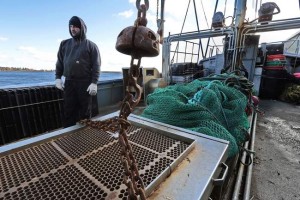 As frequently as the federal government is criticized for regulations that make it harder to keep groundfish vessels operating in the black, it is disappointing that it was state regulations that failed fishermen last week. One of the local boat owners that saw hoped-for profits disappear — a result of the necessary and justifiable decision to flee foul weather and seek safe harbor — offered to trade off fluke quota at the end of the season for the opportunity to land what he had aboard last week. The state wouldn’t allow it, based on different fluke seasons for ports in different states. Read the op-ed here 07:38
As frequently as the federal government is criticized for regulations that make it harder to keep groundfish vessels operating in the black, it is disappointing that it was state regulations that failed fishermen last week. One of the local boat owners that saw hoped-for profits disappear — a result of the necessary and justifiable decision to flee foul weather and seek safe harbor — offered to trade off fluke quota at the end of the season for the opportunity to land what he had aboard last week. The state wouldn’t allow it, based on different fluke seasons for ports in different states. Read the op-ed here 07:38
Fish and Game upheaval reveals shift in California wildlife policy
 The sudden resignation of the most adamant defender of hunting and fishing on the California Fish and Game Commission could put the finishing touches on a sweeping philosophical shift in the way the state views wildlife, sets rules for fishing and controls predators like mountain lions and wolves. Commissioner Jim Kellogg retired in late December in frustration over what he termed a lack of consideration for the sportsmen and women he represents. The resignation — combined with the unrelated recent departures of commission President Jack Baylis and Sonke Mastrup, the commission’s executive director — sets the stage for Gov. Jerry Brown to appoint conservationists to the increasingly pivotal state board. Read the article here 21:37
The sudden resignation of the most adamant defender of hunting and fishing on the California Fish and Game Commission could put the finishing touches on a sweeping philosophical shift in the way the state views wildlife, sets rules for fishing and controls predators like mountain lions and wolves. Commissioner Jim Kellogg retired in late December in frustration over what he termed a lack of consideration for the sportsmen and women he represents. The resignation — combined with the unrelated recent departures of commission President Jack Baylis and Sonke Mastrup, the commission’s executive director — sets the stage for Gov. Jerry Brown to appoint conservationists to the increasingly pivotal state board. Read the article here 21:37
Maine Lobstermen’s Association kicks off new year with focus on lobster marketing
 On Jan. 6, the Maine Lobstermen’s Association (MLA) hosted the Maine Lobster Marketing Collaborative’s executive director Matt Jacobson at its first monthly board meeting of 2016. The MLA, founded in 1954, is the state’s oldest fishermen’s organization. The MLA was instrumental in establishing the Collaborative in 2013. Lobstermen are reporting an excellent year for both volume of lobster landings and profit for the 2015 fishing season. This is in stark contrast to the steady decreases in profit the industry suffered after the economic crash of 2008,,, Read the article here 20:20
On Jan. 6, the Maine Lobstermen’s Association (MLA) hosted the Maine Lobster Marketing Collaborative’s executive director Matt Jacobson at its first monthly board meeting of 2016. The MLA, founded in 1954, is the state’s oldest fishermen’s organization. The MLA was instrumental in establishing the Collaborative in 2013. Lobstermen are reporting an excellent year for both volume of lobster landings and profit for the 2015 fishing season. This is in stark contrast to the steady decreases in profit the industry suffered after the economic crash of 2008,,, Read the article here 20:20
Fishermen urged to wear lifejackets in new safety campaign
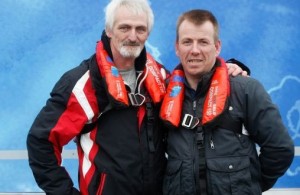 Whelk fisherman David Massey knew he was wearing no ordinary lifejacket when he hit the water unexpectedly about 11km off the coast of Wicklow in April last year. His personal flotation device (PFD) was fitted with an emergency beacon which would inform the rescue authorities of his precise location, his name, his address and his next-of-kin. “Still, I thought we were gone,” the 42-year-old, originally from Co Limerick, said. Mr Massey was one of three crew on the MFV Lavicca, which capsized off the Wicklow coast on April 15th, 2015. Read the article here 19:12
Whelk fisherman David Massey knew he was wearing no ordinary lifejacket when he hit the water unexpectedly about 11km off the coast of Wicklow in April last year. His personal flotation device (PFD) was fitted with an emergency beacon which would inform the rescue authorities of his precise location, his name, his address and his next-of-kin. “Still, I thought we were gone,” the 42-year-old, originally from Co Limerick, said. Mr Massey was one of three crew on the MFV Lavicca, which capsized off the Wicklow coast on April 15th, 2015. Read the article here 19:12






 A man featured on the reality television show “Wicked Tuna” pleaded guilty Wednesday to federal charges in Vermont he received government disability benefits while he was fishing on the show. Paul Hebert, 50, of Gloucester, Massachusetts, entered the pleas in U.S. District Court in Burlington to charges of Social Security and Medicaid fraud. Hebert was charged last summer with accepting more than $44,000 in Social Security and Medicaid disability benefits between 2010 and 2013. As part of a plea agreement with prosecutors, Hebert agreed to pay more than $53,600 in restitution. Attorneys are recommending probation for four years. Sentencing is set for May.
A man featured on the reality television show “Wicked Tuna” pleaded guilty Wednesday to federal charges in Vermont he received government disability benefits while he was fishing on the show. Paul Hebert, 50, of Gloucester, Massachusetts, entered the pleas in U.S. District Court in Burlington to charges of Social Security and Medicaid fraud. Hebert was charged last summer with accepting more than $44,000 in Social Security and Medicaid disability benefits between 2010 and 2013. As part of a plea agreement with prosecutors, Hebert agreed to pay more than $53,600 in restitution. Attorneys are recommending probation for four years. Sentencing is set for May. 

























